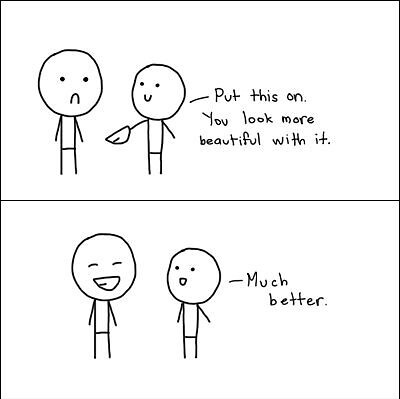Research has shown that many people drastically overestimate the effect they have on others and surprisingly this so-called “Spotlight effect“, has relevance both for the way we select items for purchase, and for those folk who feel anxious in social situations.
The Anchoring Effect and Comparison
It has been observed in studies that when judging stimuli along a continuum, people tend to compare each stimulus with the first and last stimuli. In sales and marketing, this phenomenon, known as the anchoring effect, might be used to position a less expensive product alongside a more expensive counterpart.

Let’s say you are looking to buy a hair straightener.
There is a Breville hair straightener priced at $230 and beside it on the store’s shelf, sits a GHD brand styler, priced at $300.00. The recommended retail price of the Breville hair straightener might actually be $149, but the anchoring effect means many more customers will pay a higher than recommended for the Breville hair straightener. Why?
A less expensive brand product may be priced above its real value, but the expensively priced item positioned next to it, causes them to look favourably on the cheaper option, even though it might be way above its real worth.

The expensive item is known as an “anchor”. The anchoring effect may also explain exponential increases in house prices in areas adjacent to premium real estate. People moving into an area compare house prices in surrounding suburbs and if they compare them to neighbouring premium properties, they will still assume they are getting a bargain, due to a skewed comparison.
But how does this relate to anxiety?
Social Anxiety and Self-Perceptions
The spotlight effect is an extension of the anchoring and adjustment phenomena which suggests a person uses their own internal feelings of anxiety and the accompanying self-representation as an ANCHOR.
In a similar scenario to the aforementioned incorrect comparison of the best value for money hair straighteners, a person insufficiently corrects for the fact that others are less privy to their internal anxious feelings than they are themselves. In so doing, they overestimate the extent to which their anxiety is obvious to onlookers.

Social Phobia
Clark and Wells (1995) suggest that socially phobic people enter social situations in a heightened self-focused state, namely, from a raised emotional anchor. This self-focused state makes it difficult for individuals to set aside public and private self-knowledge to focus on the task.[5]
The spotlight effect is the psychological phenomenon by which people tend to believe they are being noticed more than they really are.
Being that one is constantly in the center of one’s own world, an accurate evaluation of how much one is noticed by others is uncommon. The reason for the spotlight effect is the innate tendency to forget that although one is the center of one’s own world, one is not the center of everyone else’s. This tendency is especially prominent when one does something atypical.[1]Wikipedia
In group settings, like a class lecture or athletic competition, attention is divided between focusing on the individual and on the actions of the group. The inability to identify the split attention leads individuals to overestimate the likelihood that their peers will perceive them poorly.[7]They may overestimate the extent to which their contributions make an impact on those around them.
If an individual is merely an observer in a group, the spotlight effect is NOT overestimated as the audience’s attention is upon the presenter or main performer.
Awareness of how our perceptions work can save a lot of needless embarrassment and anxiety! It may also save you money!































